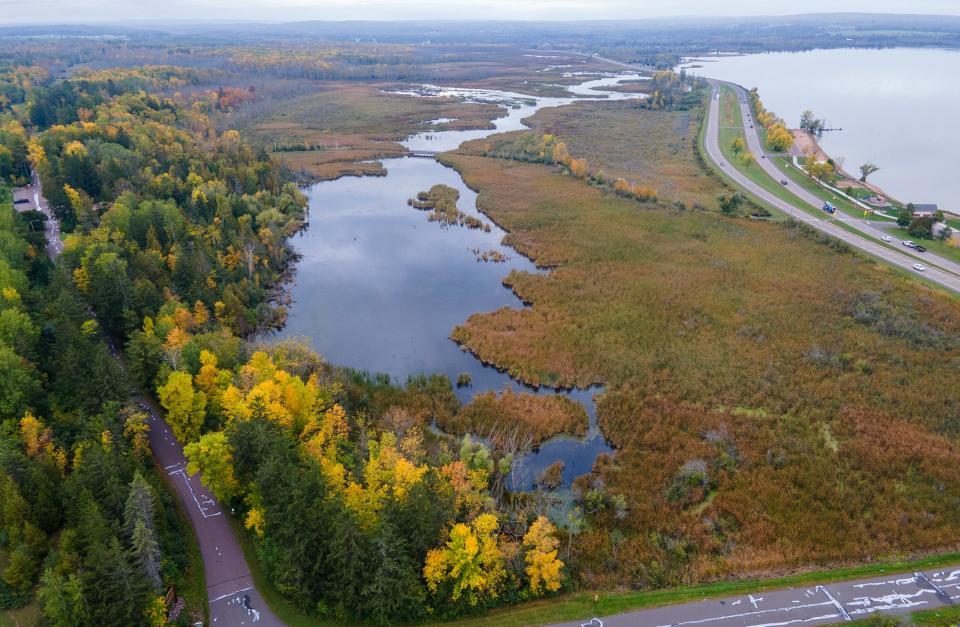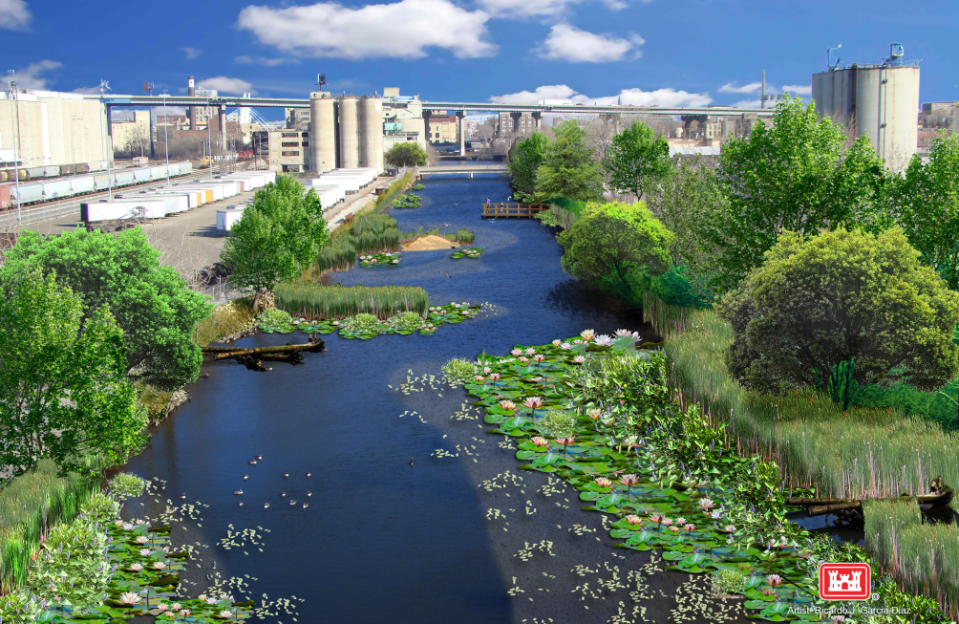Gov. Tony Evers signs bill aimed at protecting, restoring wetlands to prevent flooding
- Oops!Something went wrong.Please try again later.
MADISON – A new law will encourage local governments to restore and protect wetlands across the state, in a bid to prevent damage from major flooding events.
The grant program, to be administered by Wisconsin Emergency Management, will help communities identify and target areas vulnerable to flooding and encourage nearby communities to work together to address flooding issues.
“We all know that Wisconsin is no stranger to natural disasters — especially flooding — and that extreme weather continues to have devastating effects on folks’ lives and livelihoods, costing Wisconsin families millions of dollars in damage to homes, businesses, local infrastructure, and the environment,” Gov. Tony Evers said in a statement announcing the bill signing. “This bill is an important step to give families and communities peace of mind and the tools they need to prevent flood damage in the future.” The program offers communities two types of grants — one that provides up to $300,000 for communities to assess a wetland protection effort and another that provides up to $250,000 for implementation. The annual cost has been estimated at more than $6 million.

Sen. Romaine Quinn, R-Cameron, an author of the bipartisan bill, said he hopes the program will help to encourage more natural flood management, allowing the land to capture, store and slowly release runoff.
"Flooding is Wisconsin's most costly disaster, presenting an urgent need for communities to better understand these vulnerabilities and work proactively to reduce risks and damages," he said during the bill's public hearing in 2023. "This bill would go, literally, upstream from where damages occur and break the cycle of post-disaster response."
The program could be up and running quickly, Quinn said in an interview Wednesday, adding that several communities are waiting for their chance to apply. If the projects are successful, he hopes to see more investment from the Legislature so the work can be replicated in communities across the state.
Wisconsin had room to grow in its flood protections and policies, according to a 2023 study in the journal Climate Policy. The study compared and ranked the eight Great Lake states and found that Wisconsin fell in the bottom half compared to the other seven states.
The bipartisan bill received support from environmental groups, including the Wisconsin Wetlands Association, Wisconsin Towns Association, Audubon Great Lakes, Ducks Unlimited, Wisconsin Trout Unlimited and several other organizations, according to lobbying information. The bill also received support from the League of Wisconsin Municipalities and the Wisconsin Counties Association.
A few years ago the state was trying to strip protections for wetlands, but now "Wisconsin is at the forefront of using wetland services in a way that no other state has adopted," said Brian Vigue, policy director at Audubon Great Lakes.
"It's a huge moment for this state," Vigue said.
More: Wetlands were everywhere on the Great Lakes, how one project is helping save them
Flood protections and policies protect Great Lakes, Mississippi River, treaty rights
Tightening up protections for wetlands has become especially important after last year's Supreme Court ruling that rolled back federal protections, leaving it up to states to decide the extent these habitats should be protected.
Environmental and conservation groups worried that the court decision would create a patchwork of state protections, threatening water quality in regional waterbodies like the Great Lakes and Mississippi River.
And that fear has started playing out in both watersheds as Indiana dialed back its protections in February for the state's most regulated wetlands, making the permitting process easier for developers to build on them. Environmentalists around the region said that the move would affect states like Wisconsin that will now have to pick up the slack to keep regional waterbodies clean.

About half of the wetlands in Wisconsin have been lost since the late 1800s, most of which have been filled or drained to build cities, towns, roads and houses or converted to land for agriculture, particularly in the southern part of the state. Today, 5 million acres of wetlands cover 15% of the state.
Wetlands are important spawning and nesting grounds. They also act as nature's kidneys, filtering excess nutrients and pollutants out of the water before they can head downstream. Wetlands capture excess water during heavy rain and slow it down, protecting communities and shorelines from flooding and erosion. This ecosystem service has become increasingly valuable as climate change is bringing more frequent and intense rainfall.
An added benefit: wetlands save taxpayers money by avoiding costs going forward and supporting a dynamic landscape that can handle change, Vigue said.
While Wisconsin has several areas prone to flooding, Wisconsin's Northwoods, and especially communities along the shores of Lake Superior, have been hit hard over the last decade. In 2016, flooding from a storm in Saxon Harbor washed out roads, knocked out power and took the lives of three people as flood waters powered through the area. It caused about $10 million in damage, according to a report from the Wausau Daily Herald.
Other storms have since pummeled the northernmost portion of the state, including the Bad River Band of Lake Superior Chippewa's land, and residents of the area said having a program like this one in place would be beneficial. Ojibwe tribes have federally protected treaty rights to hunt, fish and gather throughout the ceded territories. These treaty rights can only be maintained if water is healthy enough to support fish populations and wild rice beds, and wetlands are an important part in keeping waters clean.
Ashland County Conservationist MaryJo Gringas wrote in testimony on the bill that funding for flood mitigation is limited or non-existent for communities, and instead most programs focus on the clean-up and repair after strong storms.
"Restoring wetlands and floodplains is a crucial and cost-effective strategy for storing water and reducing peak floods," she said. "These types of conservation efforts help communities identify flood risks and provide highly effective solutions."

Stiffening up flood protections is especially important for the state’s most vulnerable populations. For instance, in Milwaukee, discriminatory housing practices have pushed communities of color and low-income communities into flood zones and urban heat islands.
The Milwaukee Metropolitan Sewerage District is working to restore habitats and implement green infrastructure throughout the city that will help soak up rainwater during heavy storms. Projects are also underway through the area of concern program, which is helping to clean up the most degraded areas around the Great Lakes, like the Milwaukee Estuary.
The program will really benefit areas that continue to get hammered by flooding, Vigue said, as it will ensure there are affordable ways for communities to protect themselves.
The program will benefit every community across the state, he said.
More: What to know about wetlands and where you can find them along Lake Michigan
Laura Schulte can be reached at leschulte@jrn.com and on X at @SchulteLaura.
This article originally appeared on Milwaukee Journal Sentinel: Tony Evers signs wetlands protection bill aimed at preventing floods

